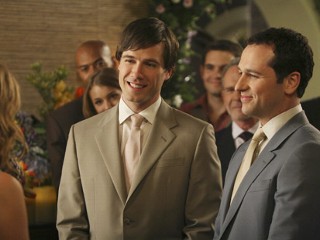Merely beloved
'Brother & Sisters' uses a civil union to draw viewers. How times have changed.
Tonight on "Brothers & Sisters," ABC is featuring the quintessential May sweeps event, but with a critical twist. It's a big fat wedding, which, along with burials and casting stunts, is how the networks inflate ratings during those months when ad rates are set. But the "Brothers & Sisters" marriage is a gay marriage - technically, a civil union, since the show's Walker clan is dysfunctional by way of LA and not Boston. And so some 11 million viewers will watch the joining of two men in what one character calls "holy man-trimony."
Stop the presses?
Actually, no. The wedding of Kevin and Scotty isn't a controversial network milestone, like those early gay and lesbian kisses on the likes of "Dawson's Creek" and "Roseanne." Indeed, it's no big deal at all. ABC has deemed a gay commitment ceremony a sweeps event; no advertisers are pulling out and no hate campaigners are shooting arrows, according to ABC; and life goes on.
Despite the decade's fraught politics about gay unions, the subject is not exactly making for incendiary TV in 2008. While gay marriage can still be a polarizing political issue, the realities of gay life - coming out, kissing, weddings - have become normalized in popular culture enough to pass by almost unnoticed on prime time.
Compare that to the noise that has accompanied so many early, pioneering network attempts to show gay people doing what straight people do, such as simply talking in bed, which triggered protest in 1989 over an episode of "thirtysomething." When Ellen DeGeneres came out of the closet on "Ellen" in 1997, there was brouhaha and there were boycotts. Now, on the day of Kevin and Scotty's nuptials, which arrives after much on-screen making out by the couple, there seems to be only
Even the writers of "Brothers & Sisters" don't bother charging tonight's wedding with conflict and controversy. Scotty's parents are certainly unhappy about the ceremony - his mother calls it a "contrived event" and a "pretend wedding" - but none of the conservative regular characters on the series blink twice. Indeed, Calista Flockhart's Kitty, a former right-wing TV pundit who has objected to gay marriage and who is now married to Rob Lowe's Republican senator, presides at the altar. "When we give up on what was," she says to all those assembled, "well that's when things we thought improbable or impossible, even, happen right before your eyes."
Kitty's reference to "what was" has a broad resonance on "Brothers & Sisters." The Walkers' Uncle Saul, played by Ron Rifkin, is a gay man who has spent his life in the closet; he finally comes out to the entire family tonight. Now in his 60s, Saul is plagued with regret for having failed to live his life out loud, without the fulfillment that his nephew Kevin has found. During the ceremony, as Kevin (Matthew Rhys) and Scotty (Luke MacFarlane) exchange rings, the camera gives us a poignant shot of Saul. He is the product of a time when gays and lesbians were more apt to spend their lives trying to come out - or trying not to come out - instead of moving ahead to find love and commitment.
"What was" represents the thinking of earlier generations that were skeptical or condemning of enduring gay unions. "Brothers & Sisters" is both expressing compassion for and distancing itself from the kind of old-school thinking that doomed gays and lesbians to short-term relationships or loneliness.
In some ways, the show's stance toward Saul and his generation reminds me of how Barack Obama tried to describe his relationship to the Rev. Jeremiah Wright in his March speech, before denouncing Wright entirely. Obama understood the roots of Wright's point of view, even while he rejected it: "For the men and women of Rev. Wright's generation," he said before once again chanting his mantra of change, "the memories of humiliation and doubt and fear have not gone away; nor has the anger and the bitterness of those years."
"Brothers & Sisters" wants to focus on the change, as well. "It's amazing, what our children teach us," Sally Field's Nora says to Saul tonight after the ceremony. "Brothers & Sisters" is no stranger to self-congratulation; the series has always served its liberal point of view with a chaser of sanctimony. But it does consistently push forward, at no cost to its popularity. Surely it's no coincidence that two of the show's key producers, Greg Berlanti and Jon Robin Baitz, are openly gay.
The road leading up to this "Brothers & Sisters" non-moment has included countless TV breakthroughs, of course, most of which have garnered attention. On the networks, the pushing of the envelope has primarily been in the context of comedy, on sitcoms such as "Will & Grace," "Roseanne," and "Friends," which gave us a commitment ceremony between Ross's ex-wife and her partner in 1996. And in the cable TV niches, writers have been delivering dramatically rich portrayals of gays and lesbians for years, on shows such as "Six Feet Under" and "The L Word." And the fact that recently out-of-the-closet celebrities such as Neil Patrick Harris and T.R. Knight are successfully playing heterosexual men has added to the de-fusing of sexual orientation on series TV.
"Brothers & Sisters" is defining a new sense of calm about gay life in America, one that involves none of the gawking and squawking that have accompanied so many of the networks' earlier attempts to normalize homosexuality. I suspect that "Brothers & Sisters" will stimulate more public controversy over its incest-tinged plot line - a growing romance between Justin Walker and the woman he thought was his half-sister - than anything having to do with gay marriage. Sometimes, the phrase "so what" is the password to the future.
Matthew Gilbert can be reached at gilbert@globe.com. For more on TV, visit boston.com/ae/tv/blog/.![]()

No comments:
Post a Comment